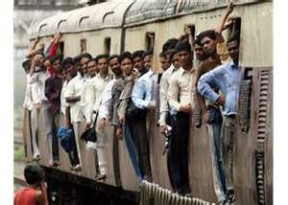The stench hits you hard when you first enter it. If a deep dark murky brown and black and yellow could reek, it would probably smell like that. Not like the benign Metro of Delhi and Kolkata, steel glinting under incandescent white lights, the high-pitched cry of the train roaring through underground tunnels, the deep darkness of the earth’s belly flashing by, no sights to see, no human sounds to hear.
This is the Mumbai local. Home to many. A travelling, killing, transporting device. And the source of livelihood to many more. Painted burnt sienna and ochre yellow, sparking at the tops where the wires touch the electric transmitters, it rolls by, almost silently, the light chug-chug seeping through your veins. Sights and sounds travel past, people, animals, fields, marshes, hills and stations. On the way, it slices stray bodies lying limply dead on the tracks, sometimes jerking off human load that it cannot carry or bear or protect.
Muddy and soiled in the rains, dusty and sweaty on summer days. It packs in more than it is built to carry. Women and men on their way to work, children going to schools that are not close to where they live, vendors selling odds and ends, food even. Books, dresses, beauty products, under garments, even washed-chopped-sorted vegetable that working women can buy to go home and toss straight into the cooking bowl. Time saving devices. The Mumbai dabbawallas…eunuchs. Animals stay in and out sometimes. College students. Tourists. People sing bhajans, chant, sometimes play Antakshri, and chatter endlessly. They share seats too. They know how it feels to stand for two hours in one place, holding out the swelling masses of humanity.
Then there are terrorists. Gunmen. Policemen who sometimes protect, sometimes molest, sometimes guard. It all depends. You stand packed in like a slice of cheese between strange bodies that have been closer to you than you would let your most intimate friends get, sweat mingling, all caste-class differences dissolving in them. You get off, often without trying to, because you get shoved out. And shoved in too. The train horn is the only music. It varies too. The long drawn honk to signal its arrival. The short and crisp honk-honk-honk three times to tell the station’s keeper that somebody fell off on the way to the station, please send emergency aid.
The marks of terror are visible everywhere. Mangled wire poles near Mulund, where a ladies’ compartment was shattered when a bomb blasted its innards. Cracks in the asbestos sheets across several other stops where the serial blasts happened. People walk on impassively, not trusting, not turning, ready to run at the slightest hint of unusual activity. Indicators blink on and off, the clocks slowly turn and the trains go on, 4:am to 2:am, hardly ever halting, hardly ever pausing.
And hands with no faces. With no names. Disembodied. Because you never know who pulled you in when the crowd was about to shove you out, let you slip between the rails into the arms of inevitable death or mutation. You yell a thanks and in 10 more seconds, the impact of having almost died leaves your nerves and you are calm again, crushed between flesh and bone but alive. It is these hands that pull Mumbai along.
Reema Prasanna is a Search Engine Marketing expert, Xoogler, baking expert and blogger. More about her here http://about.me/reema.prasanna






